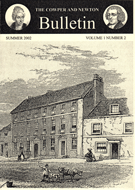NOT TO BE FOUND IN ANY OF THE BOOKS.
Between Nose and Eyes a strange contest arose, The spectacles set them unhappily wrong; The point in dispute was, as all the world knows, To which the said spectacles ought to belong. So the Tongue was the Lawyer and argued the cause With a great deal of skill, and a wig full of learning, While chief baron Ear sat to balance the laws, So famed for his talent in nicely discerning. In behalf of the Nose, it will quickly appear, And your Lordship, he said, will undoubtedly find, That the nose has had spectacles always in wear, Which amounts to possession time out of mind. The holding the spectacles up to the court, — Your lordship observes they are made with a straddle, As wide as the ridge of the Nose is, in short, Designed to sit close to it, just like a saddle. Again, would your lordship a moment suppose (‘Tis a case that has happened and may be again), That the visage or countenance had not a Nose, Pray who would or who could, wear spectacles then? On the whole it appears, and my argument shows, With a reasoning the court will never condemn, That the spectacles were plainly made for the Nose, And the Nose was as plainly intended for them. Then shifting his side, as a lawyer knows how, He pleaded again in behalf of the Eyes, But what were his arguments few people know, For the court did not think they were equally wise. So his lordship decreed, with a grave solemn tone, Decisive and clear, without one if or but, — That, whenever the Nose put his spectacles on, By daylight or candlelight – Eyes should be shut. William Cowper These witty verses were first published in Poems, 1782. Enclosing them in a letter to Joseph Hill, December 25, 1780, Cowper writes: “Happy is the man who knows just so much of the law as to make himself a little merry now and then with the solemnity of judicial proceedings. I have heard of common law judgements before now, indeed, I have been present at the delivery of some, that, according to my poor apprehension, while they have paid the utmost respect to the letter of a statute, have departed widely from the spirit of it: and, being governed entirely by the point of law, have left equity, reason, and common sense behind them at an infinite distance. You will judge whether the following report of a case drawn up by myself, be not a proof and illustration of this satirical assertion.” In a subsequent letter to Hill, February 15, 1781, he says: “I am glad you were pleased with my report of so extraordinary a case. If the thought of versifying the decisions of our courts of justice had struck me, while I had the honour to attend them, it would perhaps have been no difficult matter to have compiled a volume of such amusing and interesting precedents.” He sent these lines also to Unwin with a playful letter, dated December 1780, in which he wittily advocates the desirability of poetical reports of law cases. The title of the manuscript of this poem in the British Museum runs thus: Nose, Plaintiff: Eyes, Defendant Vide, Plowden, folio 6,000 i.e. the reference to Plowden (an eminent lawyer, author of Law Commentaries) being, of course, a playful one. What has changed between 1780 and 2002 ??? George Davies

